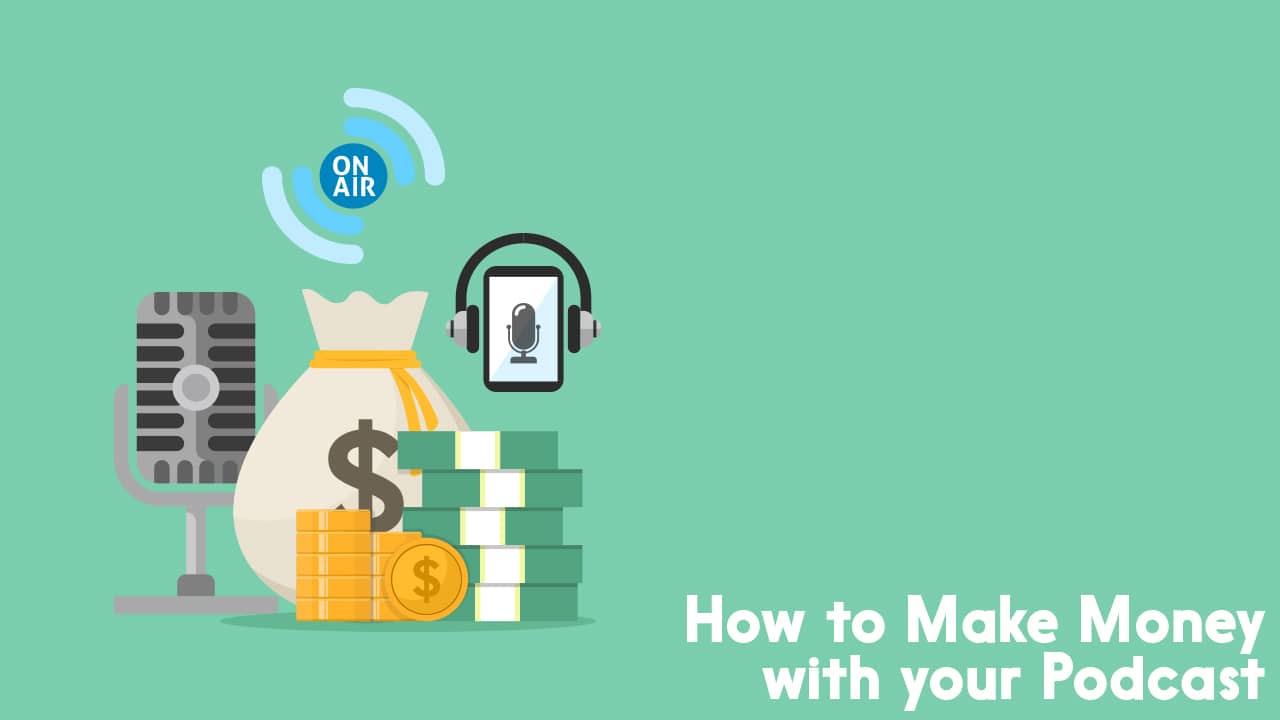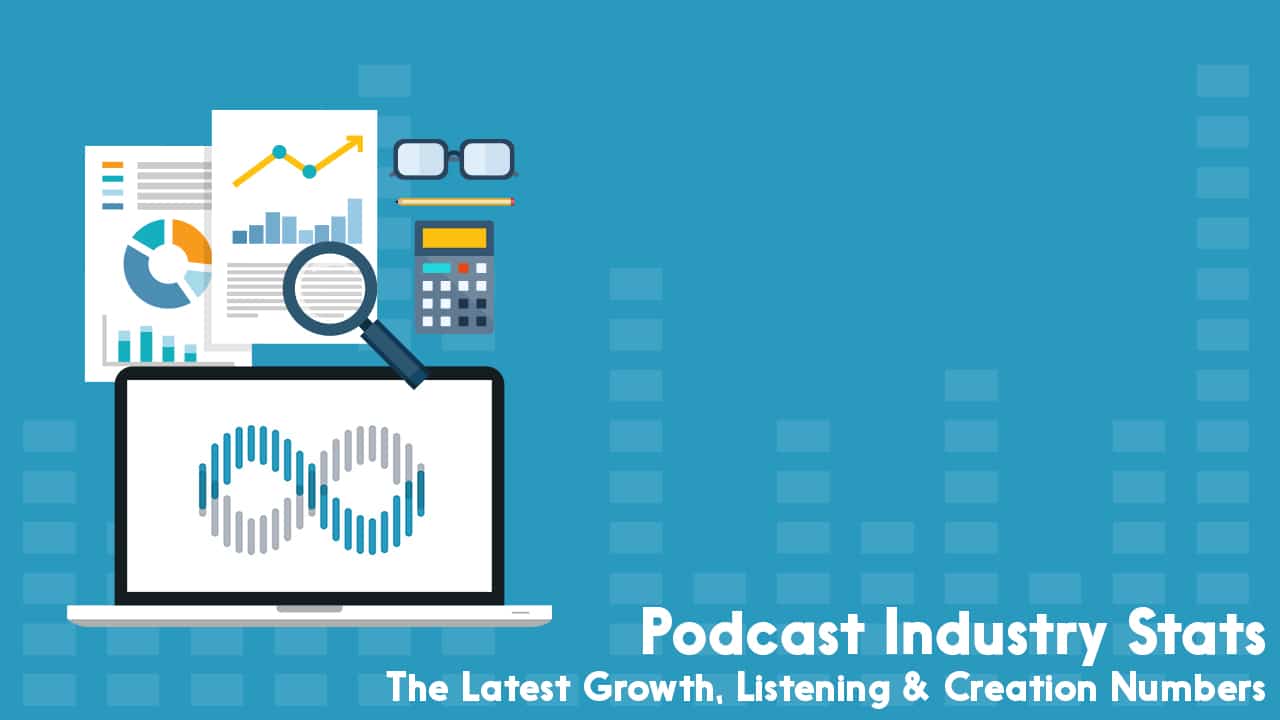What Do Podcasters *Actually* Care About? Our Survey Says…
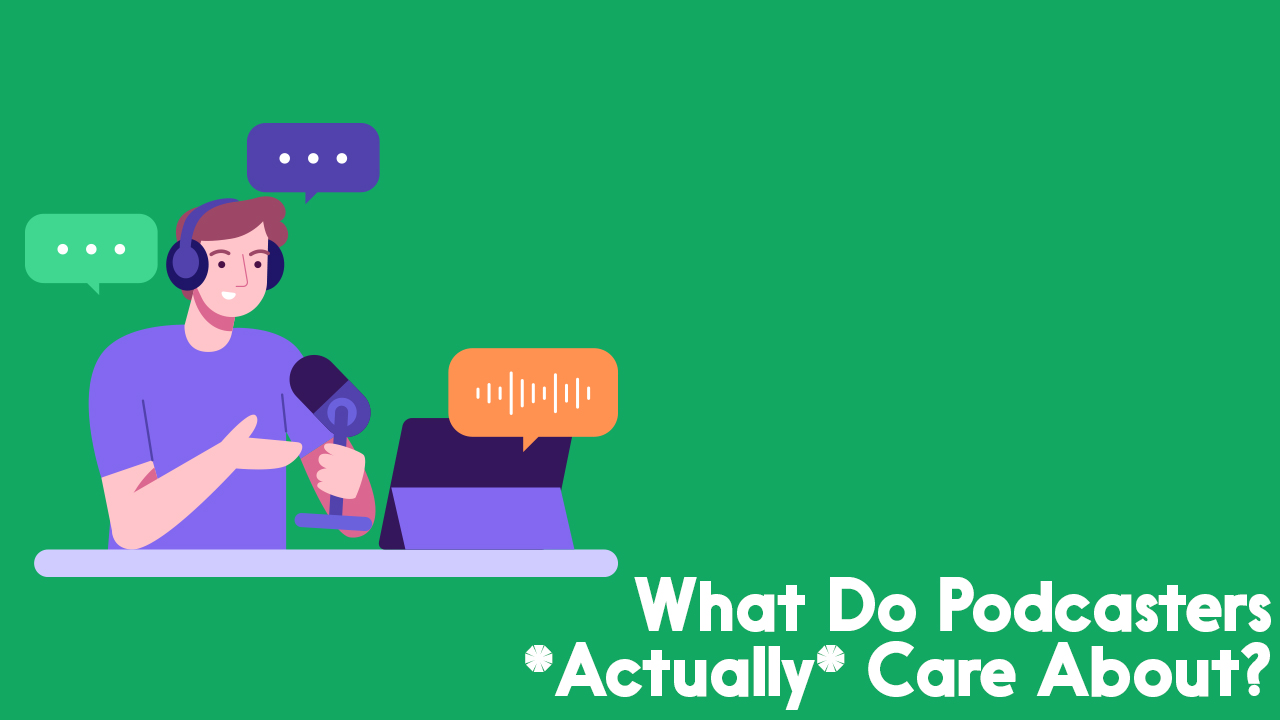
The more podcasting grows, the more people talk about it. Some of it is genuine news, and some of it is gossip or clickbait. Rather than waste your time with articles about irrelevant topics, we wanted to get some hints about what the average podcaster cares about most.
So, we put up a survey here on our site, and invited our audience to take part through the blog, email and social. We offered a few prizes to say thanks, including a 1st prize gift voucher and a few of our own books.
We were delighted to see responses from over 530 podcasters who generously shared their opinions with us. Let’s take a look at what participants think of the topics that spark debate in the content creation community.
Methodology
Firstly, a little about the methods we used for this survey.
We set up a survey on our own site, using Typeform. This asked every one of the questions below and allowed respondents to fill in their thoughts.
We worked to promote this as widely as we could, primarily by inviting responses through our email list, banners on our site here, and on our social media. We also asked friends and partners in the industry to help promote it through their own channels, and many were kind enough to do so.
We received 537 responses, in total, after this promotion. This felt, to us, enough to draw some decent conclusions.
In terms of limitations, I acknowledge that these are mainly responses from people who follow our content and who are part of our audience. This was mitigated in part by asking as many others to help us promote the survey as possible, but there’s no doubt still a bias towards our own audience. This could influence the results.
Our audience has grown throughout years of being found on Google, and via the podcast, so it has come from a relatively broad base. Anecdotally, we’ve always received questions through the entire gamut of podcasting, from launch to full monetisation, so I feel we have a diverse range of experience in our audience.
Our web analytics demographics show a reasonable spread across age, gender and country of origin. Our content category stats show a bias towards beginners content, but later-stage content like growth, monetisation, presentation skills and the like still get a lot of attention. There are, after all, a lot more beginner podcasters than those who have stuck with it for a few years!
In future surveys, I think we could do better at reaching other communities, groups and types of podcasters to make sure we’re representing the entire industry, here. I’ll commit to working with even partners to make sure we gather those opinions – watch this space for the next edition and an updated methodology!
Who Participated in the 2022 Podcaster Cares Survey?
Experience is a great teacher, but people new to podcasting have a lot of enthusiasm. Both can colour the results of a survey. We asked our respondents how long they’d been making podcasts, so we would know more about what influences their responses.
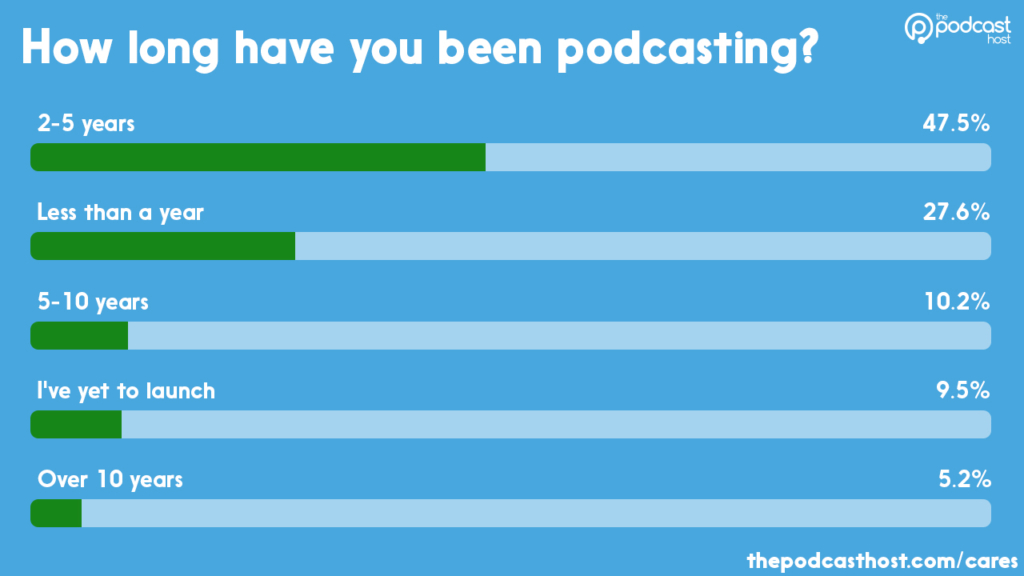
The majority of respondents had been making podcasts for 2-5 years, and the smallest group consisted of people who’d been podcasting for ten years. An interesting statistic is that nearly ten per cent of respondents had yet to launch a podcast. This makes me wonder if some of the issues we mention in the survey are real obstacles to growth.
The results here were:
- 2-5 years – 47.5%
- Less than a year – 27.6%
- 5-10 years – 10.2%
- Yet to launch – 9.5%
- Over 10 years – 5.2%
This information became more relevant when we used it as a guide to sorting other parts of the survey results. I’ll get to that later; let’s look at the results overall, first.
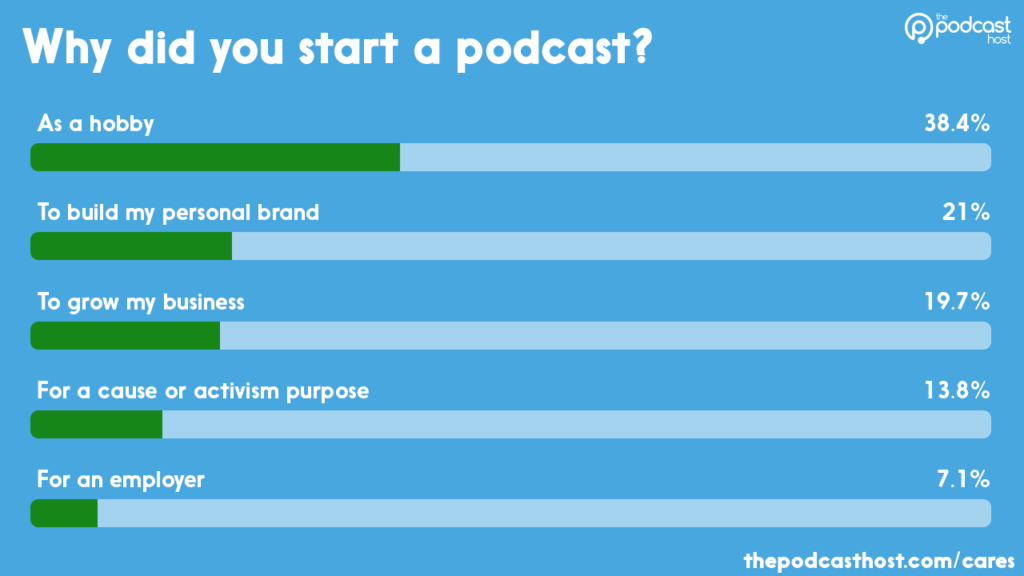
When we asked, “why did you start a podcast,” we learned that:
- 38.4% started one as a hobby
- 21% said they wanted to build a personal brand
- 19.7% wanted to grow their own business
- 13.8% wanted to podcast for a cause or activism purpose
- 7.1% make podcasts for their employer
Another way of looking at this data is that slightly less than half of the respondents produce podcasts for commerce, and slightly more than half podcast for their own growth and to help others.
Is the term “hobby” a flawed one? We got feedback from a few podcasters who felt that a “creative outlet” option would’ve more accurately described their motivation. This is a topic worth exploring: When Your Podcasting Is Not a Hobby, What Is It?
What Do Podcasters Want To Get Out Of The Process?
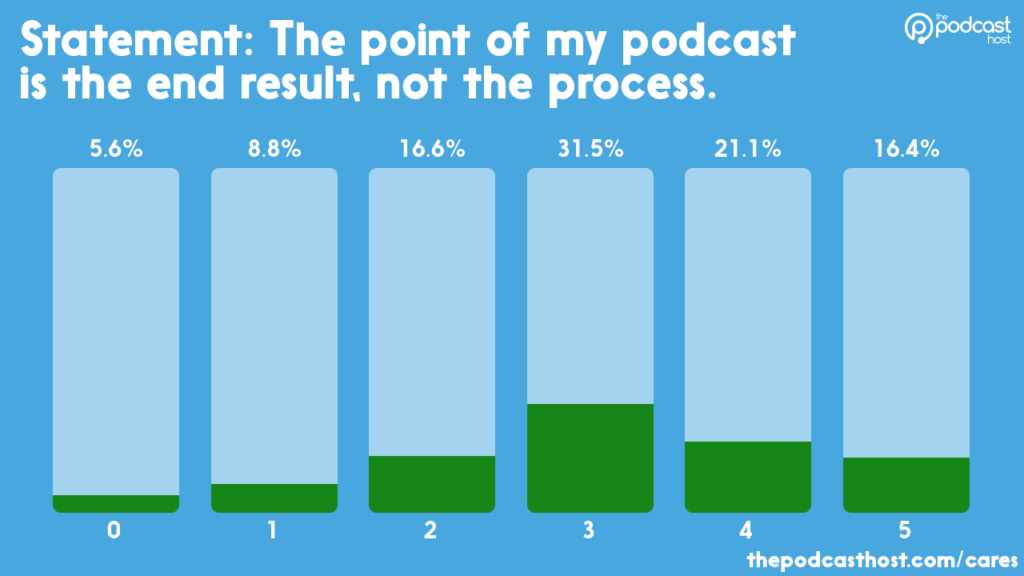
We asked participants if the point, for them, was the production process, or the end result.
- 31.5% somewhat agreed (they selected position 3)
- 21.1% mostly agreed (position 4)
- 16.4% strongly agreed (they picked 5)
- 16.6% somewhat disagreed (2)
- 8.8% mostly disagreed (1)
- 5.6% strongly disagreed (0)
if you’ve been podcasting for any length of time, you know that good things (and bad) happen at any stage of production.
Some people benefit from a great recording experience and find that far outweighs any number of downloads. Some folks pick through their reviews with a fine-toothed comb but forget about their planning process. Some podcasters care about planning, recording, and promoting, but use an automated editing process. Ultimately, it seems as though respondents care about the production process and the end results equally.
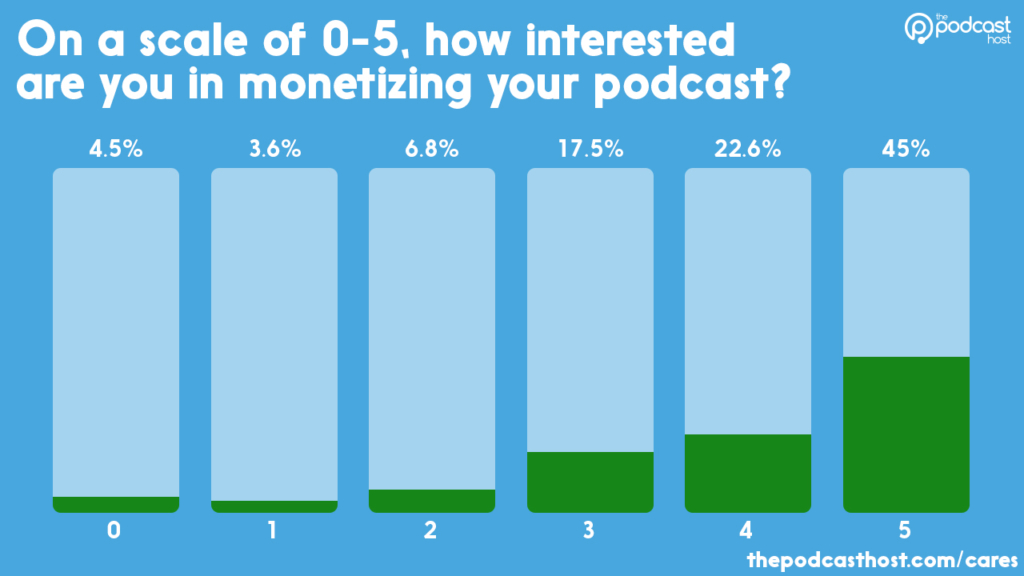
As Tom Gray of The Brains wrote, “Money changes everything.” Though many of the survey respondents produce podcasts for altruistic purposes, attitudes about monetization remained consistent with what you’d expect for people who have to buy and maintain their own tools.
- 45% strongly agreed
- 22.6% mostly agreed
- 17.5% somewhat agreed
- 6.8% somewhat disagreed
- 4.5% strongly disagreed
- 3.6% mostly disagreed
I’m slightly surprised that more respondents strongly disagreed than mostly (or, that 0 outweighed 1). Some participants care about other parts of the process more than monetization. Others care about getting paid for their work and finding ways to do that without distracting from their podcast.
The Importance of RSS, Websites, & Email Lists
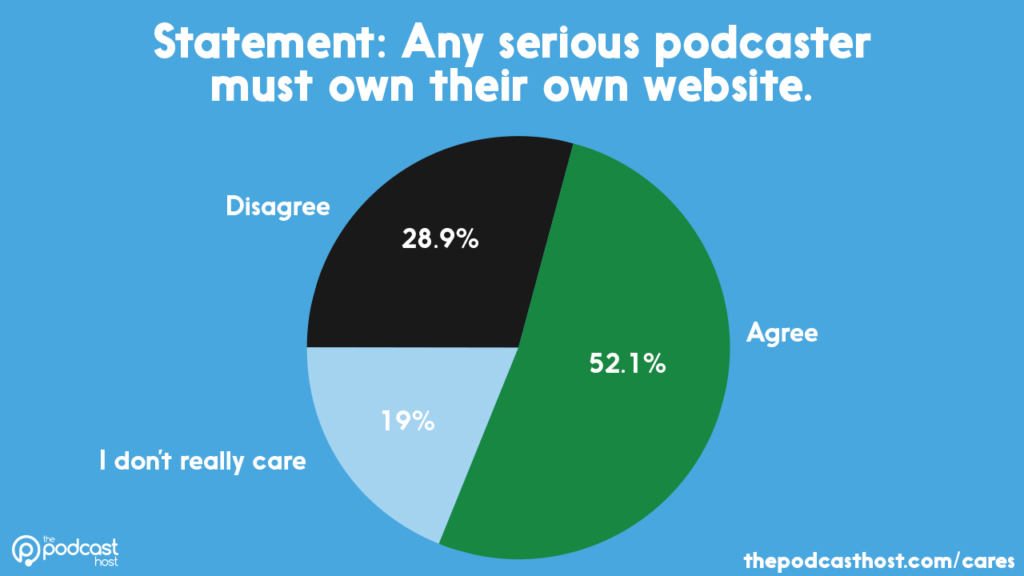
Building a good website is a lot of work. Some respondents don’t feel it’s necessary. Others consider it equal to the rest of their content strategy.
- 52.1% of respondents agreed that any serious podcaster must own their own website.
- 28.9% disagreed.
- 19.9% of podcasters surveyed didn’t care.
If you haven’t heard the phrase, “never build on borrowed land,” well, now you have. Social media platforms and directories exist at the whim of their owners. If you remember The Great Facebook Outage of 2021, you know that depending too much on one platform to share your message with the public can be disastrous. Owning your own website means you have a spot on the Internet where you control the information about your show.
On your website, your podcast can’t be outranked by negative reviews, chart placement, or unfriendly tweets. Plus, it doesn’t have to be difficult to set up. Many hosts include a website as a feature of their service. Podpage can help you set up a website in a few minutes.
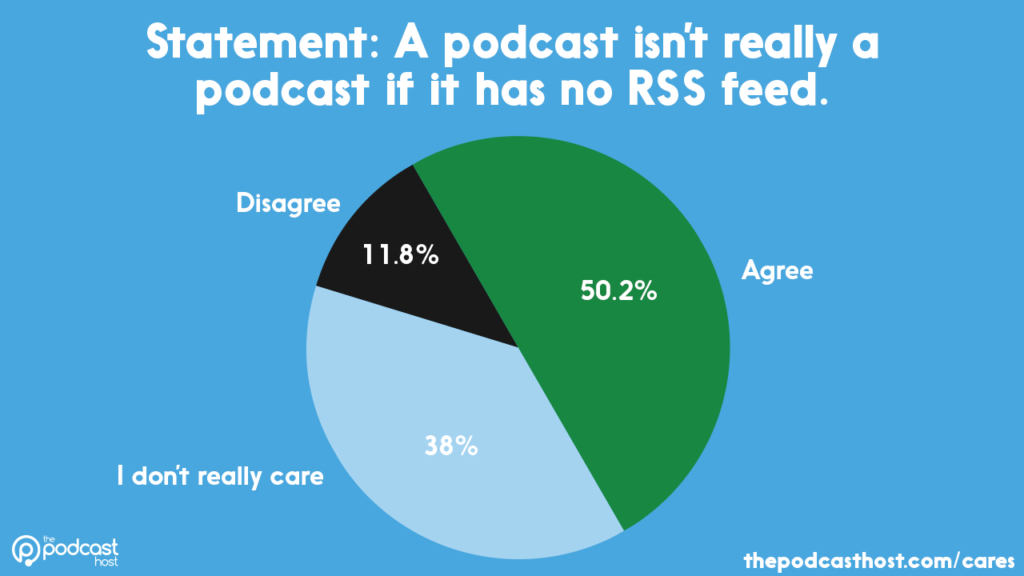
If your podcast were a train, and your episodes are the train cars, and directories like Apple or Spotify are the train stations where your audience can find your podcast, then the RSS feed is the route your podcast train takes to bring your episodes to your audience.
Many content creators skip this step, though. By publishing episodes on YouTube, they can distribute their show as widely as Apple or Spotify. Since it has episodes, branding, and so on, they call it a podcast. Do podcasters care?
- 50.2% of survey respondents agreed that podcasts and RSS feeds go hand in hand.
- 11.8% disagreed.
- 28.2% didn’t care.
Prior to RSS feeds, serial audio content, in downloadable mp3 files, was available on a player called (not the iPod, but) the i2Go. Back in the 1980s, Russian “independent radio” producers distributed their shows on magnetic tape cassettes. So, there have been and will be many ways to distribute audio content. It seems that the majority of podcasters care about RSS feeds as essential to podcasting.
In our article What Makes a Podcast a Podcast?, Steph asks how we might describe a podcast when there are different definitions of it? For example, “Can podcasts be videos on YouTube?” and “Do podcasts need RSS feeds?”
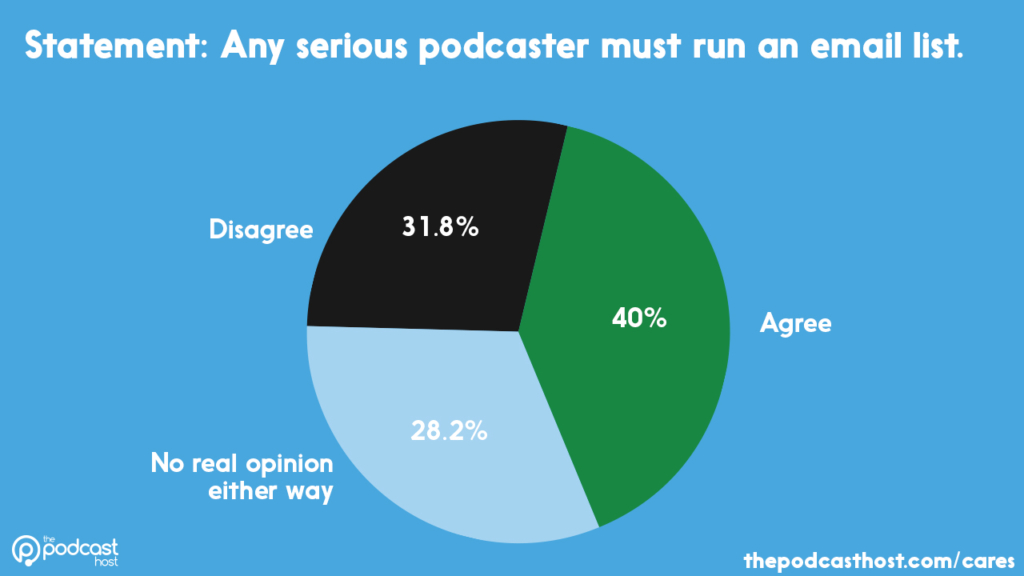
Much like a website, an email list is a solid way to control the information about your show. Again, it’s also extra work. Some people barely ever use email, preferring social media for communication. Others are the other way around. How do podcasters feel about email lists?
- 40% of podcasters surveyed agreed that an email list is necessary for serious podcasters.
- 31.8% disagreed.
- 28% had no opinion either way.
When you promote your podcast on social media, potentially thousands of users will see your post. But, they might not be interested, and your post might be drowned out by the algorithm and trending topics. Your email list might have fewer recipients, but all of them are people who are genuinely interested in your podcast. Targeted promotion beats general promotion every time.
Over half of the podcasters surveyed either disagreed or didn’t care. So, this either means that email is going the way of the dodo, or other promotion strategies are more important to podcasters. Meanwhile, 40% do care and have targeted promotion on their side.
Some Thoughts on Apple, Spotify, & Anchor
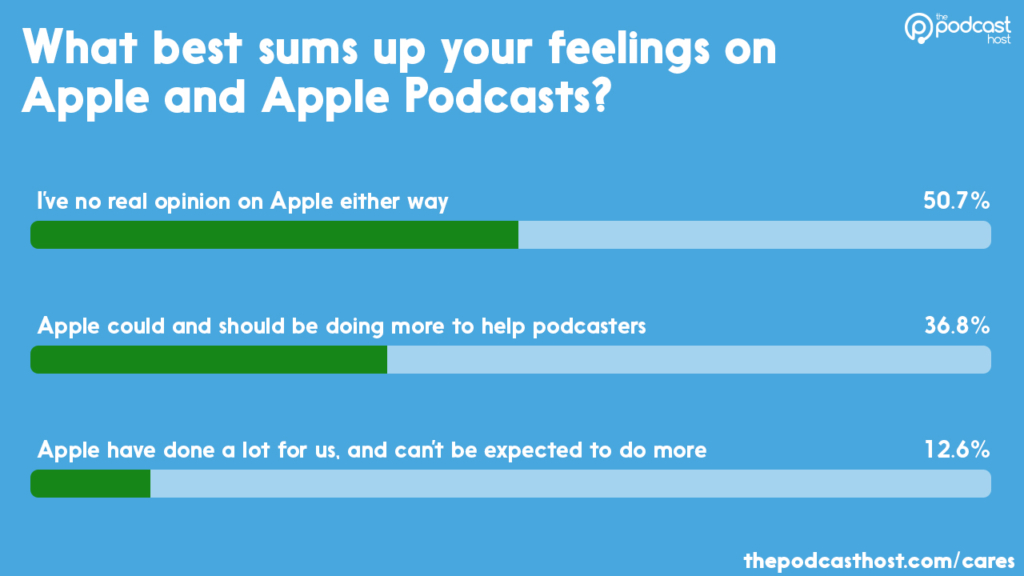
Apple put the pod in “podcast.” Once, every CTA asked for reviews on iTunes, and Apple was “wherever you find your podcasts.” But, like every tech business, they’ve had their ups and downs. For some podcasters, getting onto Apple’s New & Noteworthy list is a big goal. Others, not so much. Which statement best summed up participants’ feelings about Apple?
- 50.7% agreed with the statement, “I’ve no real opinion about Apple either way.”
- 36.8% agreed that “Apple could and should be doing more to help podcasters.”
- 12.6% agreed with, “Apple have done a lot for us, and can’t be expected to do more.”
Apple is the first publicly traded business to reach a $2 trillion market cap. There’s no doubt that the free shows that content creators produce make it much easier to sell iPhones, laptops, computers and cloud storage. A platform with reviews curated lists and influence is a big deal: the only other podcasting directory to include reviews in a way that helps podcasters is Podchaser.
In 2021, Apple started a subscription system, so that podcasters can earn money for their podcasts. Unfortunately, Apple’s rocky rollout led to bugs in the platform, depleting their user base. Has it affected Apple’s reputation over the long term? Just over half of the podcasters we surveyed don’t really care.
Limited Access: Do Podcasters Care?
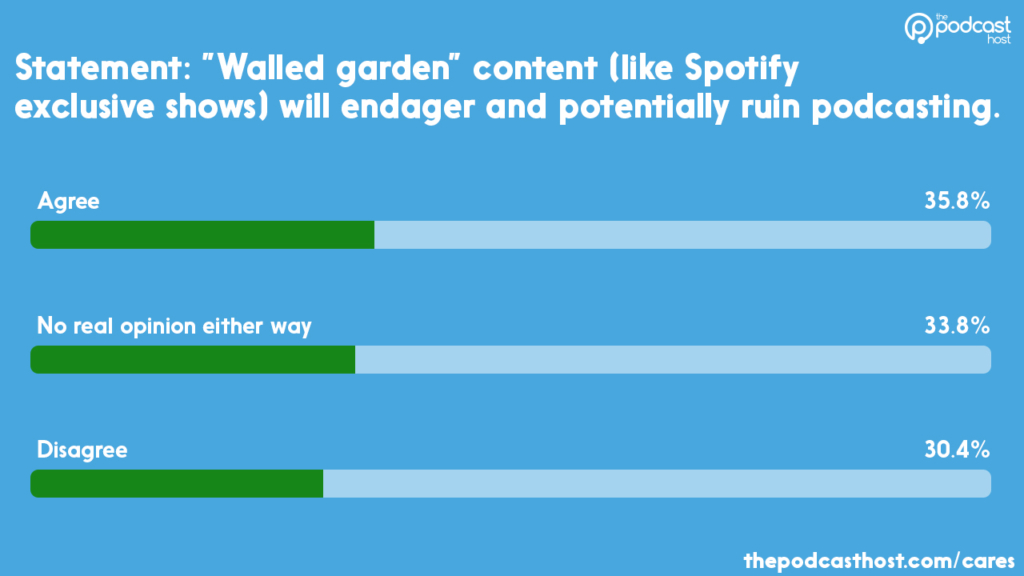
Information deserves to be free. But, some podcasts are only accessible for a price, or they’re not making new episodes. We explored whether or not “exclusive” or “dead” shows are harmful to podcasting in detail. For now, how do participants feel about podcasts that are less accessible than others?
We asked about paywalled content, such as Spotify exclusive shows.
- 35.8% agreed that “Walled Garden” content is bad for podcasting
- 33.8% had no real opinion either way
- 30.4% disagreed.
The nearly even split between the three options suggests that exclusive content isn’t a dealbreaker for podcasters overall. In fact, audiences are smarter than content streaming services think.
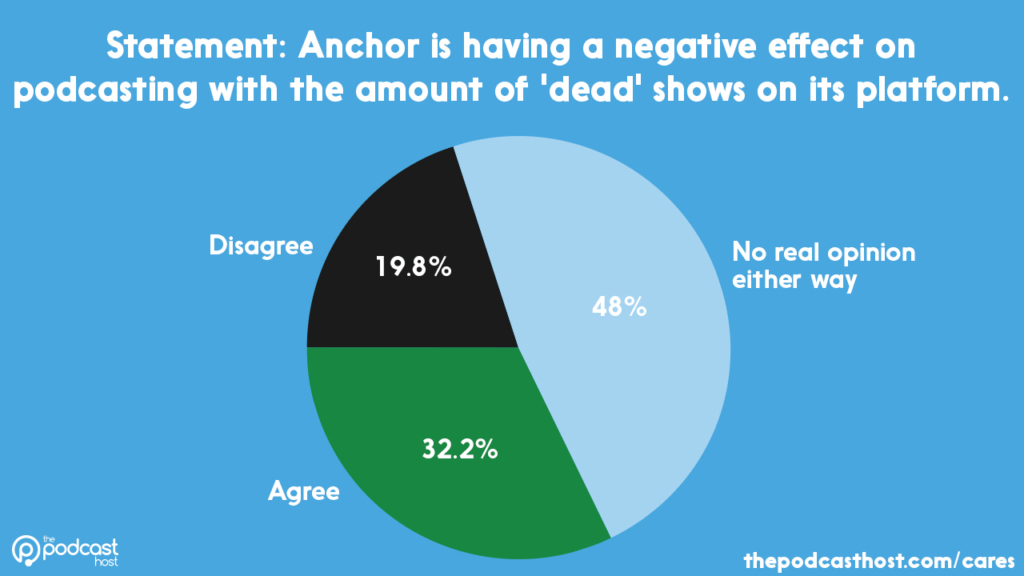
Anchor is a free media hosting service that many podcasters try when they’re first starting to produce a show. In June of 2021, Podnews reported that 43% of the podcasts hosted on Anchor have only one episode, and fewer than 19% of podcasts on that platform has been updated in the past 90 days.
- 48% of respondents have no opinion about inactive or “dead” shows.
- 32.2% felt that Anchor’s stable of inactive podcasts reflects poorly on podcasting in general.
- 19.8% disagreed.
Media hosts can entice podcasters to try their service with claims about Anchor’s “deadness.” It seems as though they shouldn’t bother, and that podcasters care more about features and price than inactive shows.
What About Bitrates & Loudness?
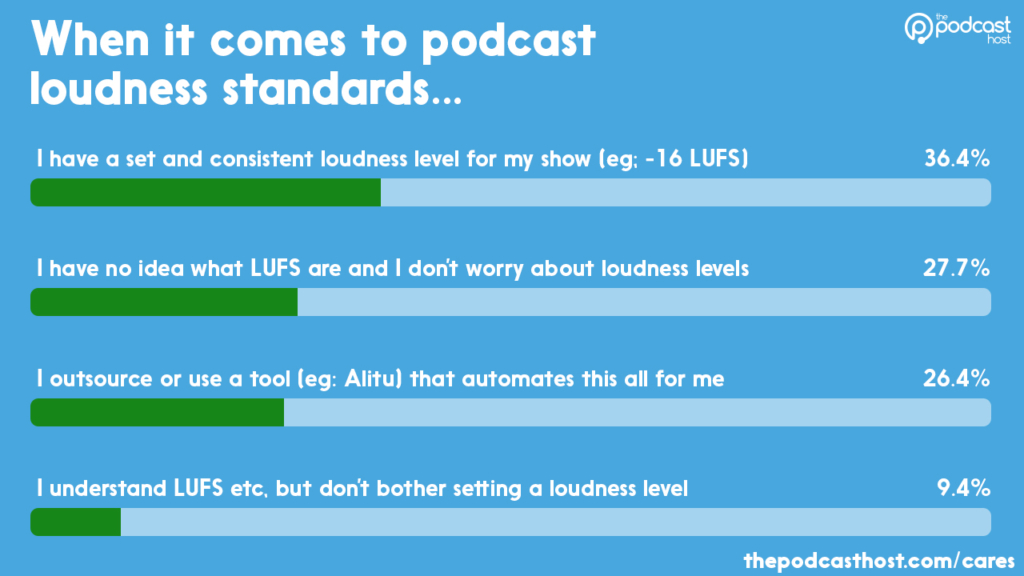
The fine detail of audio editing can make or break a podcast’s popularity, and the audience might never know why that episode made them uncomfortable. Do our respondents care about loudness standards?
- 36.4% said that they have a set and consistent loudness level in their editing process.
- 27.7% neither knew about this, nor worried about it.
- 26.4% automate loudness levels with a tool like Alitu.
- 9.4% said they know what this means, but don’t bother setting a level.
Audio editing and sound design are art forms that can depend on subtlety and nuance. We explain loudness standards in our article, How Loud Should a Podcast Be? If you’re a podcaster that cares about these topics, read on! Otherwise, let’s move on to another often-ignored topic, bitrate.
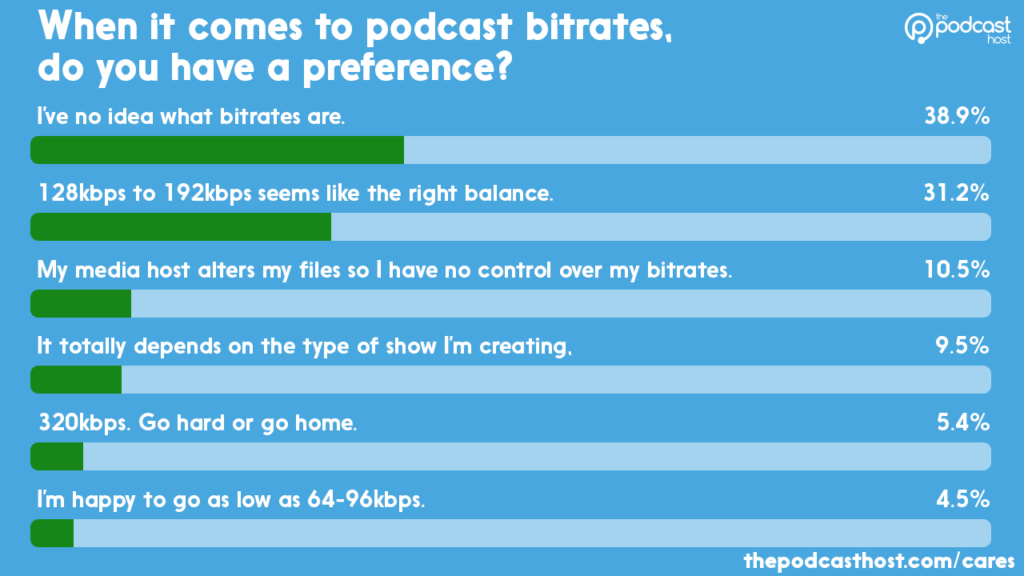
Bitrate can affect a podcast’s download speed, how detailed the sound quality is, and even the price of your media hosting service. For many podcasters, it’s unimportant. For some, though, it’s the difference between a charcoal sketch and a high-density photograph. We asked respondents what their preferences were concerning bitrate.
- 38.9% said they had no idea what bitrates are.
- 31.2% said that “128 kbps to 192 kbps seems like the right balance.”
- 10.5% said that their media host alters their files, so they have no control over bitrate.
- 9.5% said “it totally depends on the kind of show I’m creating.”
- 5.4% said, “320 kbps. Go big or go home.”
- 4.5% agreed with, “I’m happy to go as low as 64-96 kpbs.”
If you fall into the majority camp and are still curious about bitrates, you can learn about how it affects file size, podcast audio quality, and more, in Colin’s article, What Bitrate Should I use For A Podcast? Does It Even Matter? And, if you want to hear what a higher bitrate can do, listen to Season 9 of Our Podcraft podcast, where we explored Creating Highly Produced Podcasts.
From Hosting to Censorship
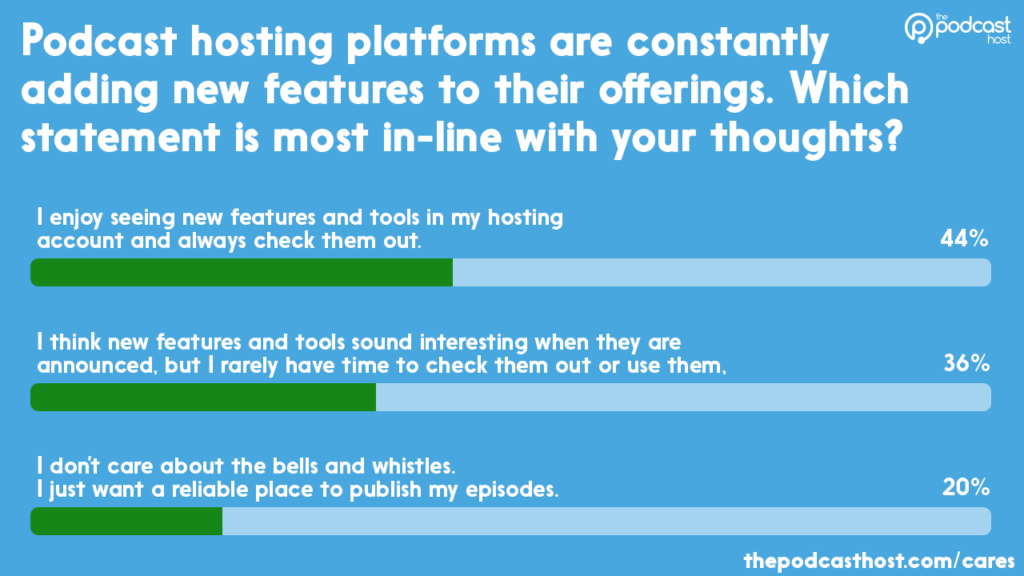
If a media host is where your podcast’s audio files live, and the landlord was constantly adding new amenities to the building, you’d check it out, right? After all, you’re the one who’s paying the rent. Or, would you? Podcasting is a lot of time and effort. Not everyone enjoys beta testing new options.
- 44% of respondents agreed with, “I enjoy seeing new features and tools in my hosting account and always check them out.”
- 36% agreed with, “new features and tools sound interesting when they’re announced, but I rarely have time to check them out.”
- 20% said, “I don’t care about the bells and whistles, I just want a reliable place to publish my episodes.”
Competition between media hosts is stiff nowadays. Some offer features which can make a big difference to your show, such as transcription services, dynamic ads, or crowdfunding assistance. Our Guide to The Best Podcast Hosting Sites can help you find out if you’re getting the most out of your media host.
I did not mean to make that corny rhyme, but I’m not sorry, either. However, here’s a misstep that’s proved educational.
Next up, we’d like to acknowledge a flaw in our Podcast 2.0 Namespace question options. We’d included what we felt were the 3 most common answers to this question, based on our own experience. But we appreciate that lack of an “other” option might’ve been frustrating for some. We’ll take this on board and learn from it next time.
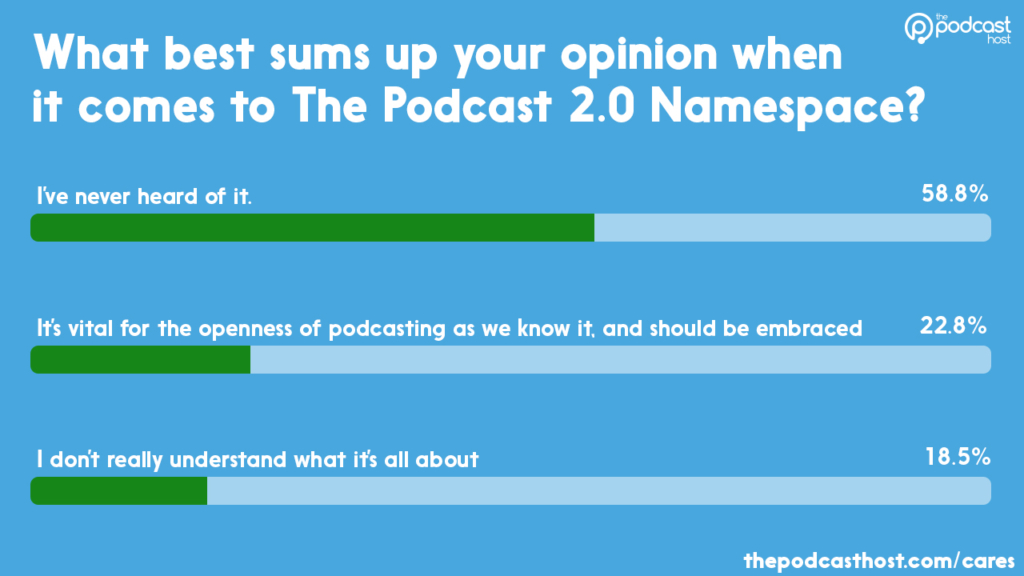
Of the podcasters who responded to this question:
- 58.8% had never heard of it
- 22.8% agreed with the statement, “it’s vital for the openness of podcasting,”
- 18.5% agreed with “I don’t really understand it.”
The Podcast 2.0 Namespace has advocates that are mind-blowingly passionate about it. But, a lot of podcasters either don’t know about it, or don’t understand how it works. Clearly, this is a topic we need to research and understand before making any broad statements.
Speaking of broad statements:
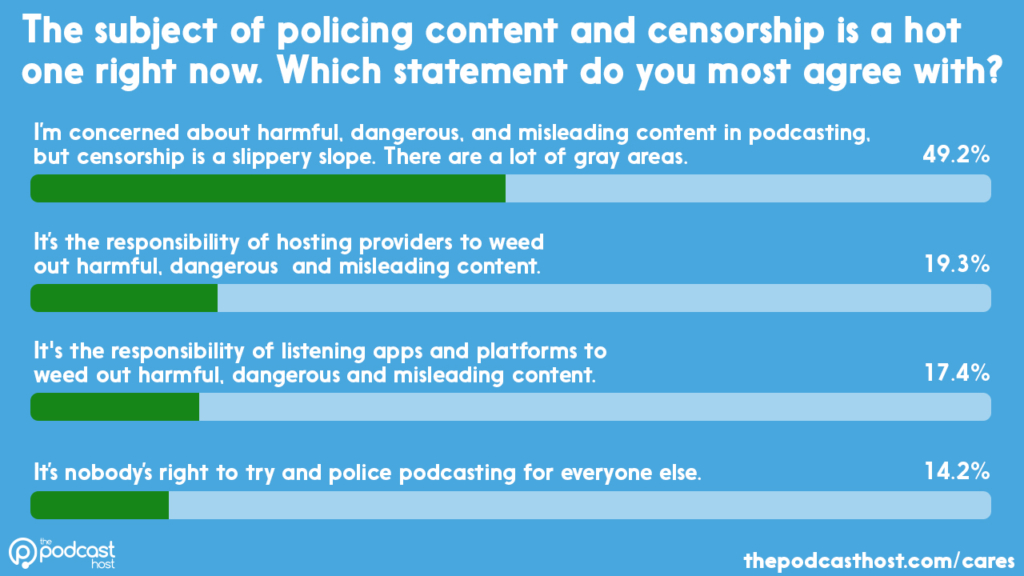
We explored this topic in more detail in this article, Do Podcasters Want More Censorship in the Medium? Freedom of self-expression is something that podcasters prize and censorship would be the opposite. But, nobody likes death threats or false claims, either.
- 14.2% of respondents said no one should police podcasting for others.
- 17.4% said that listening apps and directory platforms are responsible for weeding out harmful content.
- 19.3% said that hosting providers have the responsibility to weed out harmful content.
- 49.2% said they were concerned about harmful, dangerous and misleading content in podcasting, but censorship is a slippery slope.
Are NFTs Welcome in Podcasting?
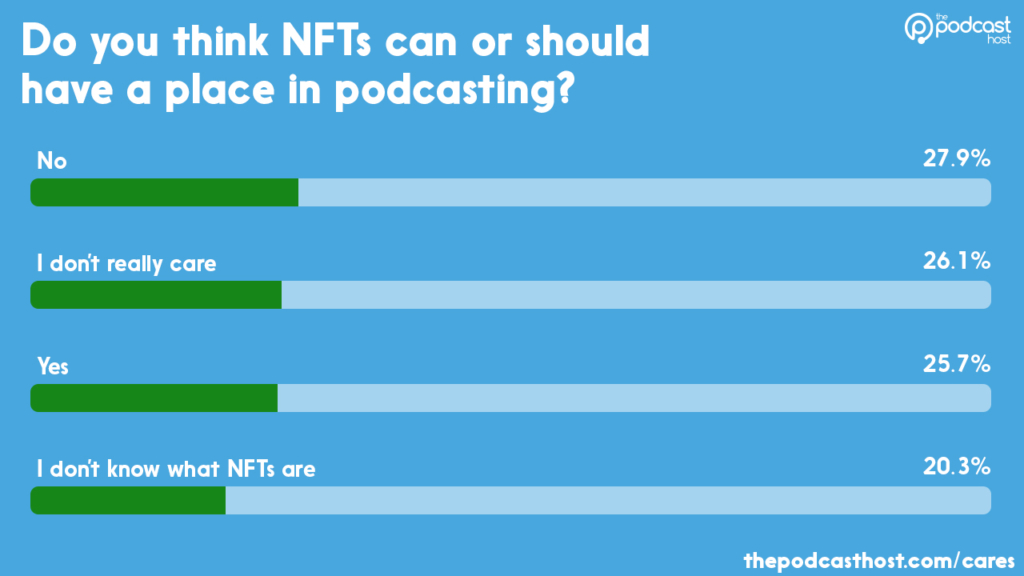
NFTs, or non-fungible tokens, are a controversial topic in the digital content industry, the investment world, and the art world. We considered exploring NFTs recently. The feedback folks sent to us was energetic. So, we included this question in our survey.
- 27.9% said No.
- 26.1% said they don’t care.
- 25.7% said Yes.
- 20.3% said that they don’t know what NFTs are.
Though “No” was the most popular answer, the remaining opinions have compelling enough numbers that this is a topic worth learning more about. But, so are a lot of other elements of digital content creation.
Are Podcasters Social?
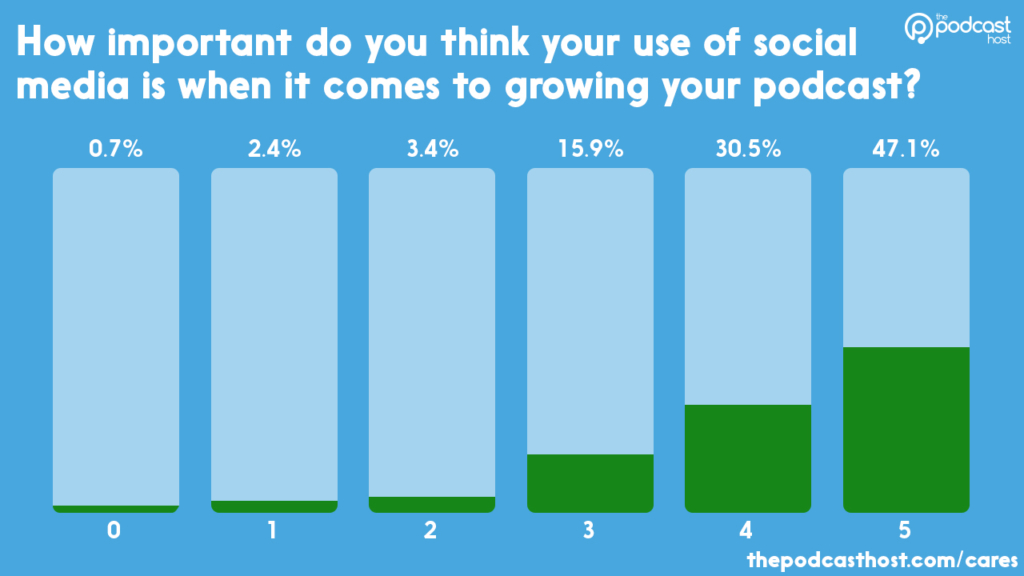
Whether you love or hate it, there’s no arguing that social media is integral to podcasting promotion. It puts your podcast information in front of a lot of people, and it costs nothing but time and attention. But, time and attention are resources worth guarding. We asked how much respondents feel that social media is important to podcast growth.
- 47.1% said that they thought it was extremely important.
- 30.5% said it’s very important.
- 15.9% said it was somewhat important.
- 3.4% said it was somewhat unimportant.
- 2.4% said it was really unimportant.
- 0.7% said it was completely unimportant.
if you’re interested in learning more about growing your podcast with social media, you might want to check out these resources:
- Do Podcasters Need Social Media?
- Meet Edgar for Podcasters: Scheduling Your Social
- How to Effectively Run Your Podcast Instagram
- A Beginner’s Guide to Audiograms
- Do I Need a Social Media Manager for My Podcast?
How do Podcasters Measure Success?
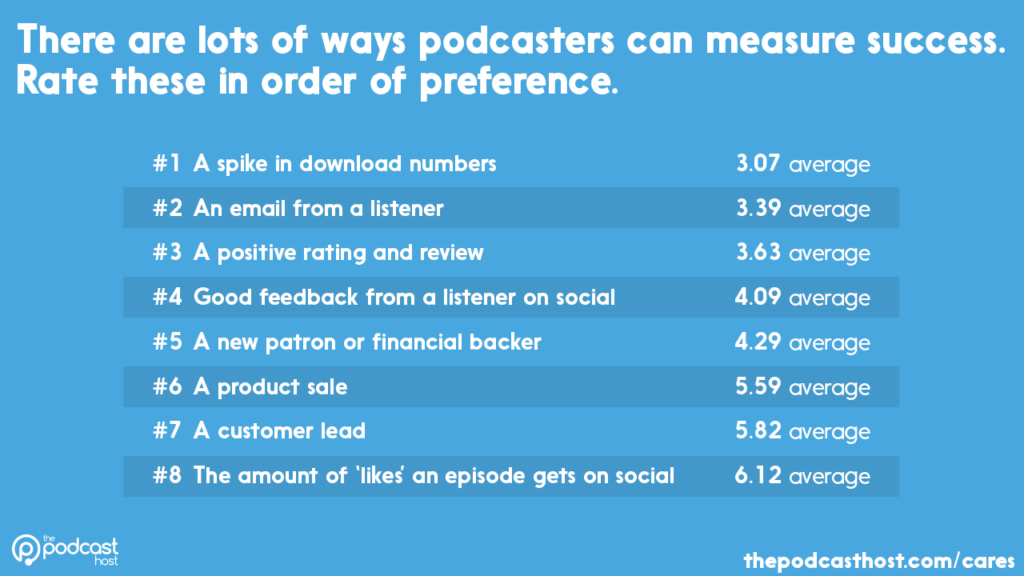
Success is a tough thing to quantify, especially in a creative industry. When you’re making something new, you have to define the goal you want to meet or the target you want to hit. Otherwise, others will define success for you. Next thing you know, they’re moving the goalposts.
We wanted to know what measure of success our participants care about most. In order of importance, here’s how the majority responded:
- A spike in download numbers
- Audience email
- A positive rating and review
- Good feedback from a listener on social media
- New patron or financial backer
- A product sale
- A customer lead
- the amount of “likes” an episode gets on social media (a lot of people publicly showed they specifically liked a particular episode)
So, although most participants care about spending time on social media, they don’t seem to place much importance on likes, hearts, and thumbs-ups. In our experience, these have never reflected download numbers anyway. And those are, ultimately, what podcasters are looking at the most.
What Happened to Podcasting In 2017?
Why do I ask? Because the responses provided were different in certain areas, based on whether the respondents had been podcasting for:
- Five years or more
- Fewer than five years, or had yet to launch
This is where the responses from the first survey question became very important. We divided the data into two groups, by how long people had been podcasting, and found a few trends.
Podcasters of 5 years or more seem to have stronger opinions on Apple Podcasts and RSS Feeds
- 67.5% of the 5 years or more group agreed that a podcast isn’t really a podcast if it doesn’t have an RSS feed.
- Of the folks in podcasting for fewer than five years, 39.8% agreed, whilst 38.9% didn’t care.
- 25.3% in the 5 years or more group didn’t care about RSS feeds.
- 44.6% of the 5 years or more group believe that Apple could and should be doing more to help podcasters. This is compared to 34.9% of the newer podcasters group.
- 53% of the newer podcasters have no real opinion on Apple either way, compared to 34.9% of the 5 years or more group.
Newer podcasters seem to pay less attention to podcast loudness & bitrates
- 60.2% of podcasters of 5 years or more have a set and consistent loudness level for their show.
- This is compared to 31.4% of folks podcasting for 0-5 years.
- 29.7% of newer podcasters don’t worry about loudness levels.
- This is compared to only 15.7% of the 5 years or more group.
- 42.9% of newer podcasters have no idea what bitrates are. Only 15.7% of the 5 years or more group thought the same.
So, what caused the difference of opinion?
In 2021, National Public Media and Edison reported that spoken-word audio listenership had grown by 116% since 2014, among listeners aged 18-34. As listenership increases, more people probably say, “I can do that.” Plus, the demand for good podcasts breeds demand for software to make podcast editing easier, like Alitu. So, it’s not that one particular event happened five years ago to divide podcasters into two camps. Podcasting is growing, and putting down new roots.
Looking for More More Podcasting Stats?
Hopefully you found our Podcaster Cares survey data as interesting and insightful as we did. We’re grateful to everyone who took part, and to those who shared the survey around, too. We’re also grateful for the feedback on our questions which offered suggestions on how we can improve our surveys in future.
Congratulations too, to the lucky prize draw winners. One podcaster bagged themselves $100 to spend on Amazon, whilst a few others have copies of Podcast Growth and The Podcast Host Planner on their way to them.
Finally, here’s your data fix in the form of our Podcast Statistics & Industry Trends report.
